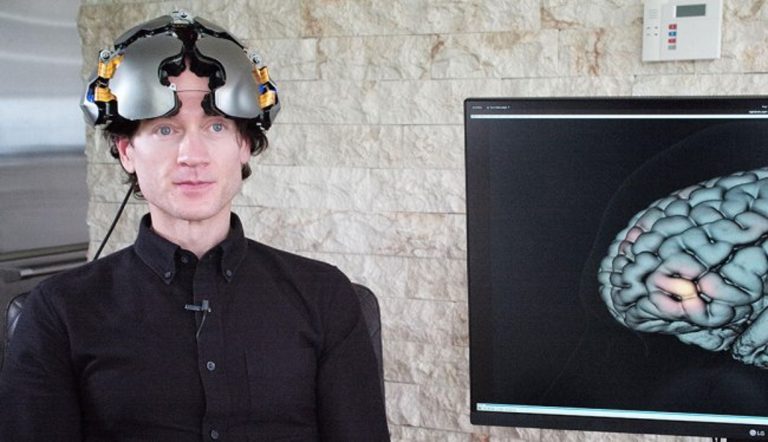The early days of Werner Herzog’s new documentary Theater of Thoughts (2024), we meet Bryan Johnson, a venture capitalist who has invested in several science companies and founded the neurotech company Kernel. We see Johnson and neuroscientist Raphael Yost (who sometimes serves as Herzog’s sidekick in the film) trying on Kernel’s diagnostic helmet, which monitors blood levels in the brain and highlights activity with color area. Yost tests the helmet by telling an “outrageous” lie and watching how his brain lights up. But the most outrageous thing he could think of was that five plus five equals 11, and the brain image didn’t light up in any meaningful way. This anticlimactic plot encapsulates much of the film, which is ostensibly about technology’s ability to unravel mysteries and expand the capabilities of the human brain.
Johnson was a perfect character for Herzog, whose career created a colorful cast of characters, from a former prisoner of war to revisiting the site of his captivity Little Dieter needs to fly (1997) To a hapless amateur bear conservationist grizzly man (2005). Unfortunately, you wouldn’t know this Theater of Thoughts. Herzog describes Johnson in a voiceover as “colorful,” without revealing that he is on an obsessive, quixotic quest to reverse aging and defy death itself, often through scientifically dubious means. Instead, the film leaves him behind and follows Herzog and Yost on a road trip to talk to various experts about the state of neuroscience and the many possibilities new technologies offer the field.

The film’s overall looseness and heavy reliance on interview-based vignettes makes sense, given its genesis as a partnership between Herzog and Yost’s Neurorights Foundation. The film isn’t exactly an advertisement for the foundation, but it does seem to be guided by Yost and company’s concerns about subjects like the legal protection of people’s psychological data.
Of course, this begs the question: whether we are actually capable of converting human thoughts into readable data. When IBM Vice President Dario Gil explained quantum computing, Herzog spoke for him in narration, admitting that he had no idea what Gil was talking about and that he suspected the audience didn’t either. It’s a hilarious moment, pure Herzog, but he does often appear to be out of his depth in the film and too willing to let his subjects make questionable claims without rebutting or delving deeper The implications of their ambitions and fears for themselves and/or society. I also can’t explain some of the parts it contains, such as the sit-down with famed World Trade Center tightrope walker Philippe Petit. The man isn’t boring, but we don’t learn anything about the brain from him.
However, Herzog sprinkles in enough grace notes that the Theater of Thoughts stand out. Few people would have spent much time capturing world-renowned brain scientist Christoph Koch’s morning rowing routine before talking to him, or thinking about brain scans by pointing out how a dead fish exhibits cognitive activity on a dead fish. Disadvantages of technology. equipment. His narrative style is as engaging as ever – the way he says words like “Mormon” and “Siri” in a dulcet Bavarian accent is striking. Still, the film doesn’t display the kind of philosophical resonance or sheer weirdness that we know Herzog to possess.



Theater of Thoughts “2024,” directed by Werner Herzog, will screen at Film Forum (209 West Houston Street, Greenwich Village, Manhattan) on December 26, 2026, and in other select theaters nationwide in the coming months show.

